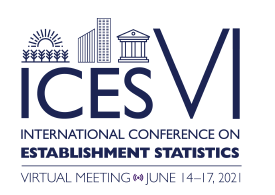All Times ET
Program is Subject to Change
TBD
Variance Estimation Under Nearest Neighbor Ratio Imputation (307981)
*Jae-Kwang Kim, Iowa State UniversityKatherine Jenny Thompson, U.S. Census Bureau
Shu Yang, North Carolina State University
Keywords: Nearest neighbor ratio imputation, variance estimation, skewed population, finite population correction
Nonresponse is an unfortunately reality in surveys, either for an entire survey unit (unit nonresponse) or for selected items provided by a survey unit (item nonresponse). Estimates of totals will be biased unless both forms of nonresponse are treated. For a highly skewed and positive outcome, as commonly arise in business populations, the bias effects can be quite large. With such skewed populations, nearest neighbor imputation is an appealing missing-data treatment when one or more auxiliary variables that are strongly predictive of outcome is available. To avoid directly donating values from a much larger or smaller donor, we consider a modification of the nearest neighbor imputation, called nearest neighbor ratio imputation (NNRI). With NNRI, a non-missing item is available for both the donor and recipient, and the ratio of the nearest neighbor is used for ratio imputation. NNRI is especially appealing when the missing data comprise a set of detailed items that sum to an observed total. We study some asymptotic properties of the NNRI and proposed methods for consistent variance estimation. The performance of the proposed variance estimator is investigated via an extensive simulation study. Finally, we present an empirical application to product data from the 2012 Economic Census.
